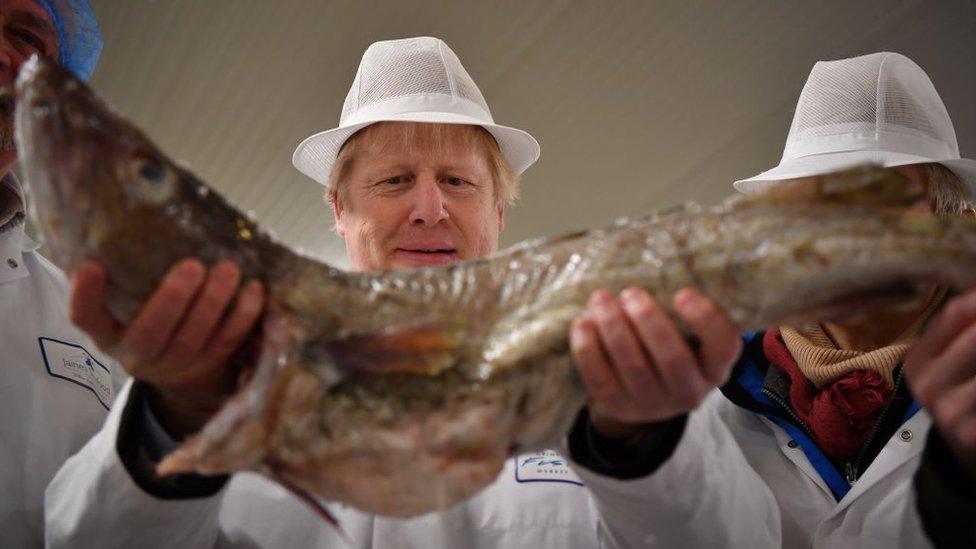Covid and Brexit: The battle to control a sprawling crisis
- Published
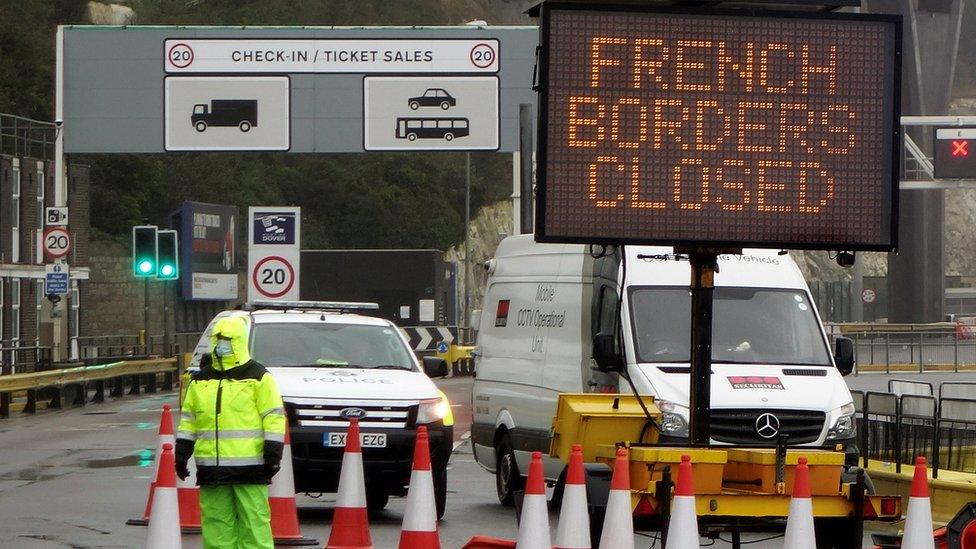
It's normal for Westminster and Whitehall to have fallen almost silent by this time of year.
Parliament has normally packed up by now, and although government doesn't exactly stop, it certainly quietens down.
While it's pretty much deserted today (Monday), that's because people who live and work in this part of the country have been told to stay at home because of tighter restrictions to curb the new variant of the virus.
But behind closed doors, and online, officials and ministers are frantically trying to manage different aspects of what seems now a sprawling crisis.
As one official said: "It's a Covid diagnosis with transition symptoms."
The new variant of coronavirus has accelerated the spread of the disease, increasing the pressure on the NHS, intensifying the restrictions that millions of us are living under, forcing millions of people to cancel their carefully prepared Christmas plans.
There are even extra police being made available to monitor the border between Scotland and England.
Once again, ministers are telling the public to "stay at home".
Scary speed
But other countries are forcing Brits to do just that too.
More than 40 are forbidding travel from the UK. Most acutely that's putting pressure on freight moving across the Channel.
Queues on the M20 in Kent aren't exactly unheard of, but the French decision to close the border is dramatic and has caused a lot of disruption.
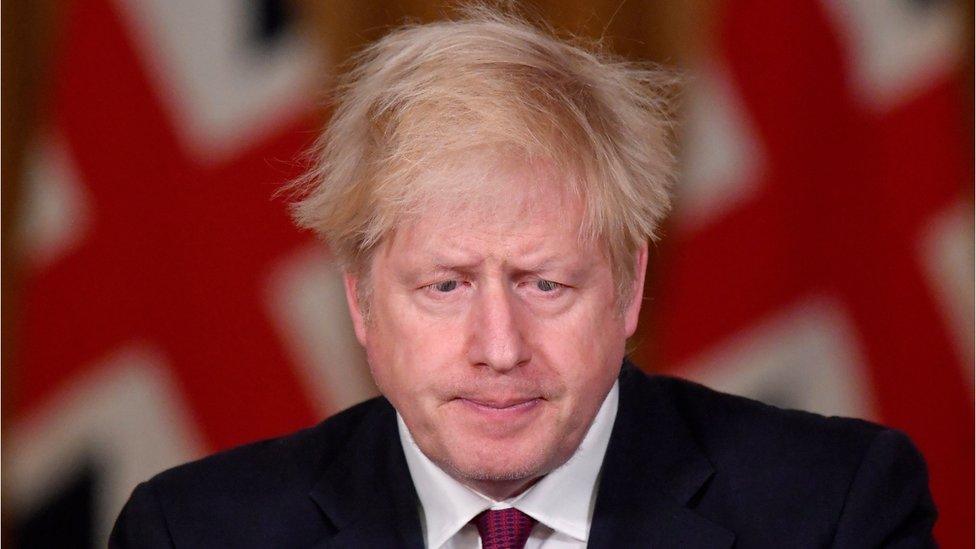
Boris Johnson is beset by a growing list of problems
Politicians on both sides of the Channel are hopeful they might be able to agree a way of getting things moving again before the end of the year. But if that requires a massive expansion of testing for coronavirus at the border, that's easy to say, far harder to do.
Downing Street expected that other countries might respond to news of the virus variant with travel bans, but that doesn't make managing the fallout any easier.
Travel disruption, even if things get moving in the next 24 hours, is costly for all kinds of business, as well as frustrating for anyone caught up in it.
And that's on top of the economic strains from the reintroduction of tougher coronavirus limits, with the economy already having shrunk during the pandemic at a scary speed.
Huge uncertainty
When we're all being told to stay at home, we are not out spending money - at a time when the tills should be ringing.
It's only a couple of days since the chancellor announced he would extend emergency support to pay people's wages until the end of April, to try to encourage firms to keep staff on the payroll.
Each hour of disruption makes the risks worse. Each day of tougher limits makes it harder.
This is all happening during a time of huge uncertainty anyway.
We still do not know, less than two weeks before the country unplugs from its biggest trading partner after four decades, whether it will do so with a secure arrangement in place, or whether the status quo will disappear leaving our economy, our security, and so much else besides in the unknown.
The UK and the EU have been moving towards a vital trade deal for months, but the last mile is proving the hardest.
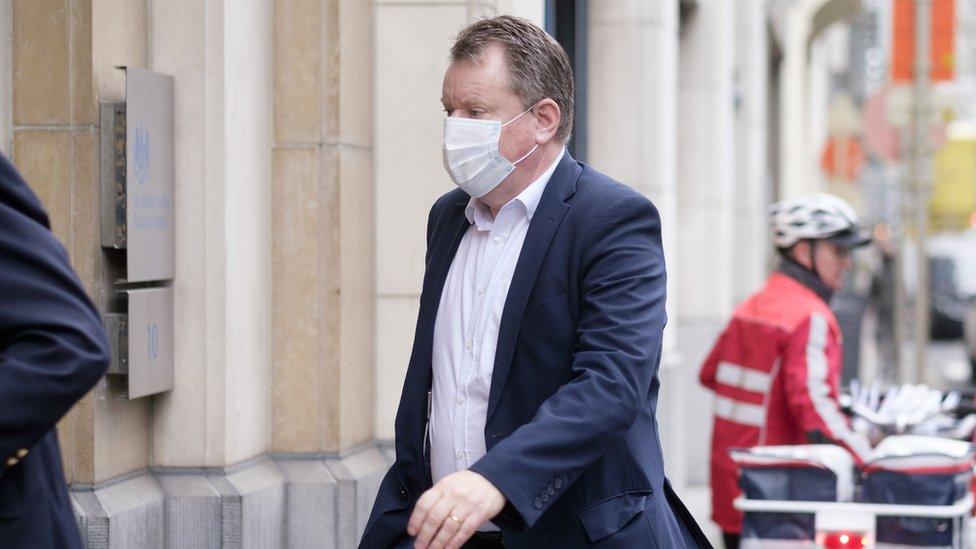
UK negotiator Lord Frost heads into the latest round of last ditch talks in Brussels
In the past fortnight, there have been a couple of moments when it's seemed that pens were poised to sign, but clashes of principle have kept agreement just out of reach.
We have now passed the point where a trade deal could be done and pushed through Parliament before Christmas.
There are even suggestions it could be finalised on Christmas Eve, then rushed through just before New Year.
'Less drama'
Such a last-minute agreement would be better than the political failure of no deal at all, which is, still very much a possibility.
Other politicians might wish to use today's disruption to push the prime minister to agree the deal, or to extend the process. That doesn't find any favour in No 10, however.
One of Boris Johnson's first actions after his general election victory was to set himself a firm, legal Brexit deadline.
He may very nearly be hitting it hard, but has no intention of pushing it back again.
And his allies suggest his long-held view that the UK must prise political control to make Brexit worth it, won't be shoved aside by short-term disruption from this stage of the pandemic, or anything else.
Ironically, just as the various problems that government faces conspire to make the situation more acute, uncertainty over Brexit means the government is better prepared that it might otherwise have been.
For months officials have been working on a plan called "D20", designed to deal with potential disruption caused by the end of the transition period on 31 December, significant extra pressure on customs and borders whether there is a deal or not.
Under the co-ordinating hand of the Cabinet Office, the Department for Transport, the Home Office and border officials have been practising dealing with emergencies like this for months.
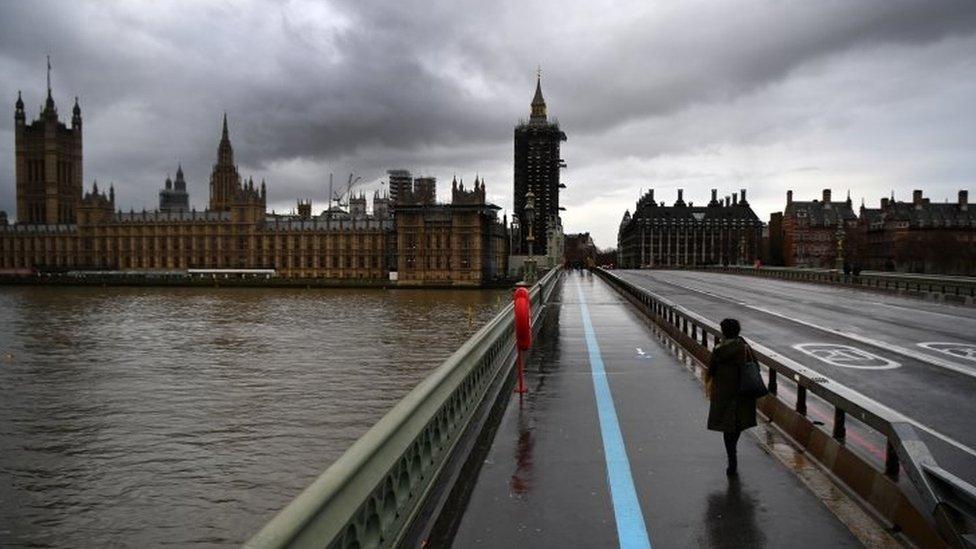
Westminster is even more quiet than it usually is at this time of year
That's why one minister involved in what's going on today told me "there is less drama than you might imagine", suggesting that actually behind the scenes "everything is clicking into place" because there have, literally, been rehearsals for this kind of situation.
The disruption has been brought about by the new variant of the virus, but has had some of the same effects that the change in our status with the EU might have at the end of the month.
Just because the government has practised for this situation, however, doesn't mean it's not serious.
The longer today's delays and disruption go on, the harder the impact will be to contain, and in 10 days, with or without a Brexit deal, they could be repeated for a different reason.
The country is still in the grip of this horrible disease. The economy is still being battered by the attempts to keep it under control.
And the UK is isolated for now from its neighbours and much of the rest of the world.
Practical and political problems are colliding in a way that seems like the plot of a bad action movie.
If only it weren't sadly real.


- Published30 December 2020

- Published18 December 2020
